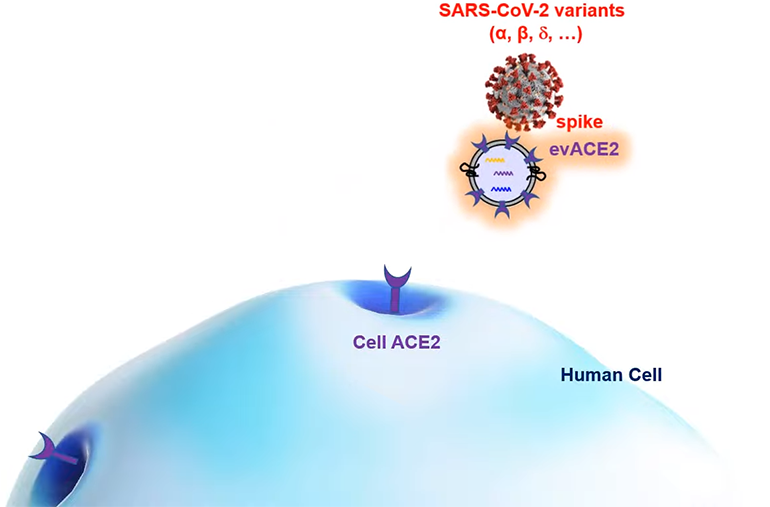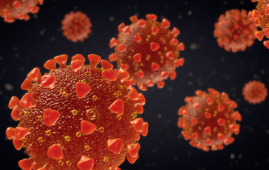

Researchers at Northwestern University have discovered naturally-occurring extracellular vesicles in the blood that contain the ACE2 protein, which is the cellular target of SARS-CoV-2. The vesicles act as a binding site for viral particles within the body, and prevent them from binding to and infecting cells. Unlike vaccines, therapeutics based on this finding are unlikely to be affected by changes in future variants of the virus, since they are based on the target site in the body rather than the virus itself. The research team hopes to develop the nanostructures into a therapeutic that could be delivered as a nasal spray.
Our weaponry against SARS-CoV-2 is constantly evolving, in large part thanks to an enormous effort by scientists during the pandemic. From vaccines to anti-viral drugs, we have developed numerous approaches that involve targeting the virus itself. However, this latest approach takes a leaf from our body’s own defenses, in the form of a naturally-occurring decoy that binds viral particles and keeps them from binding to cells.
The basis for this proposed technology is naturally-occurring extracellular vesicles that are present in the blood during SARS-CoV-2 infection, and which appear to increase in number in more severe infections, presumably as an escalation in the body’s anti-viral response.
The researchers have called these vesicles “evACE2” as they contain the ACE2 protein, which is the protein target of the virus in our own cells. Happily, the virus isn’t fussy about where it binds to the protein, and will harmlessly bind to the protein when it is present on the evACE2 nanobubbles as they float about the blood. Intriguingly, employing such nanovesicles as an anti-viral therapeutic has a key advantage: they are unlikely to become obsolete when the virus mutates.
“Whenever a new mutant strain of SARS-CoV-2 surges, the original vaccine and therapeutic antibodies may lose power against alpha, beta, delta and the most recent omicron variants,” said Huiping Liu, a researcher involved in the study. “However, the beauty of evACE2 is its superpower in blocking broad strains of coronaviruses, including the current SARS-CoV-2 and even future SARS coronaviruses from infecting humans.”
So far, the researchers have shown that the vesicles can bind and inhibit the virus in vitro, and they demonstrated that the vesicles had a 135-fold higher potency when blocking the binding of the viral spike protein compared with the ACE2 protein alone. The vesicles also protected laboratory mice from lung injury and death during SARS-CoV-2 infection.
Another advantage of evACE2 is that as they already occur naturally within the body, they are likely to be well tolerated as a treatment, and are unlikely to be inherently toxic when administered. Generating such vesicles in the lab is the next challenge for these researchers, and determining a route of administration. So far, the Northwestern team suggested that a nasal spray might be a good way to deploy the vesicles.
more recommended stories
 Phage Therapy Study Reveals RNA-Based Infection Control
Phage Therapy Study Reveals RNA-Based Infection ControlKey Takeaways (Quick Summary) Researchers uncovered.
 Safer Allogeneic Stem Cell Transplants with Treg Therapy
Safer Allogeneic Stem Cell Transplants with Treg TherapyA new preclinical study from the.
 AI in Emergency Medicine and Clinician Decision Accuracy
AI in Emergency Medicine and Clinician Decision AccuracyEmergency teams rely on rapid, accurate.
 Innovative AI Boosts Epilepsy Seizure Prediction by 44%
Innovative AI Boosts Epilepsy Seizure Prediction by 44%Transforming Seizure Prediction in Epilepsy Seizure.
 Hypnosis Boosts NIV Tolerance in Respiratory Failure
Hypnosis Boosts NIV Tolerance in Respiratory FailureA New Approach: Hypnosis Improves NIV.
 Bee-Sting Microneedle Patch for Painless Drug Delivery
Bee-Sting Microneedle Patch for Painless Drug DeliveryMicroneedle Patch: A Pain-Free Alternative for.
 AI Reshapes Anticoagulation in Atrial Fibrillation Care
AI Reshapes Anticoagulation in Atrial Fibrillation CareUnderstanding the Challenge of Atrial Fibrillation.
 Study Reveals Cold May Impact SARS-CoV-2 Infection Rates
Study Reveals Cold May Impact SARS-CoV-2 Infection RatesThe Unexpected Protective Role of Rhinoviruses.
 Hemoglobin as Brain Antioxidant in Neurodegenerative Disease
Hemoglobin as Brain Antioxidant in Neurodegenerative DiseaseUncovering the Brain’s Own Defense Against.
 Global Data Resource for Progressive MS Research (Multiple Sclerosis)
Global Data Resource for Progressive MS Research (Multiple Sclerosis)The International Progressive MS Alliance has.

Leave a Comment